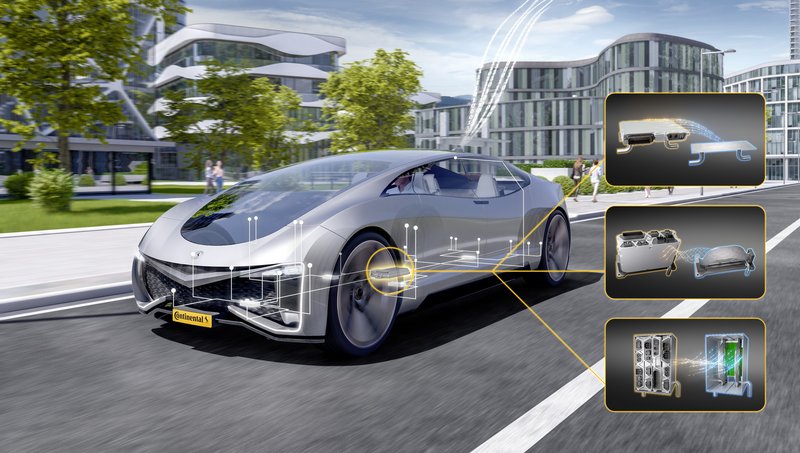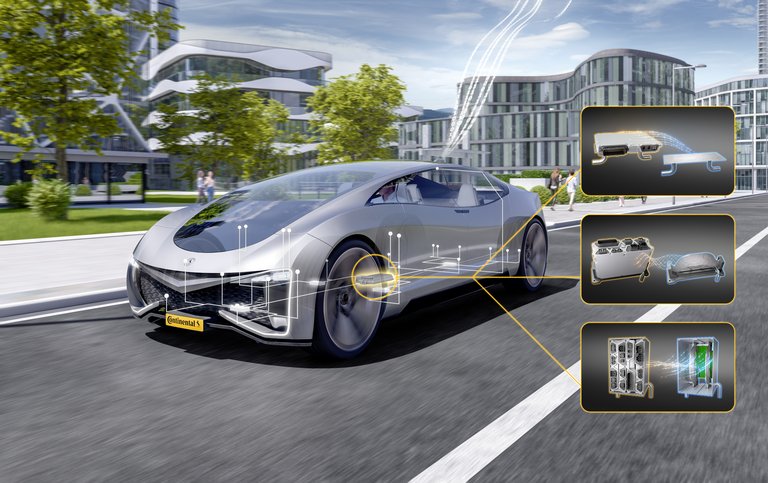Computing power that evolves further: "Plug & Play" solution for vehicle computers from Continental
- The software-defined vehicle (SDV) is changing the market for vehicle manufacturers and suppliers
- Modularity and scalability are the cornerstones of the hardware architecture: Thanks to Plug & Play, individual computing modules can be exchanged or upgraded in the field, almost as with desktop PCs
- Continental sets standards with new flexible cooling concept
Regensburg, Germany, June 15, 2023. With its Plug & Play concept, Continental is presenting a modular and highly scalable solution for the integration of high-performance computers (HPC) in vehicle architectures. The highlight: Individual computing modules can be replaced or upgraded even when the vehicle is already in the field. Combined with a new type of liquid cooling based on flexible cooling pads, the system always maintains a safe operating temperature. As a result of the great leaps forward in SDV development, more and more functions in the vehicle are being controlled, monitored and maintained by software. According to various analysts, the market volume for software-based vehicle functions and services is expected to reach $640 billion by 2031. For example, vehicles will have to process ever greater volumes of data and enable a growing number of software functions for automated driving functions or infotainment applications. To do this, they need modular and powerful HPCs that can be integrated into a vehicle's E/E architecture in a scalable and flexible way.
"We focus on a flexible and scalable concept for cross-domain HPCs including an innovative cooling solution for all vehicle classes. Our plug & play solution requires less installation space and reduces the complexity of the vehicle architecture as well as the wiring harness. In addition, we enable individual computing modules to be exchanged and upgraded when the vehicle is already in the field," says Jean-Francois Tarabbia, head of the business area Architecture and Networking at Continental.
Modularity and scalability
The HPC solution can be easily and quickly adapted to any customer requirement. During development, Continental focusses on greatest possible modularity. This means: The HPC modules can be combined to different configurations and the computing power can be scaled at any time to meet requirements. Vehicle manufacturers can integrate individual HPCs or rely on modular stack or rack solutions that combine different HPC modules in a single unit.
The integration of different modules in one box enables savings on costly cabling, especially for the high-speed exchange of data. Thanks to the plug & play approach, individual computing modules can also be exchanged in the field, similar to graphics cards or hard disks in classic desktop PCs.
Plug & Play Fluid Cooling System
The high computing power of HPCs can reach a power dissipation in the range of 1KW, depending on the application. This must be reliably managed by means of liquid cooling so that the internal components remain within a safe temperature range. Up-to-date, existing solutions cannot be implemented without interrupting the cooling water circuit and require the application of a thermal paste between the cooler and the electronic control unit, making the replacement of electronic control units complicated and cumbersome. Continental is introducing a new type of cooling concept that significantly simplifies replacement. The system consists of a new type of cooler in the form of flexible cooling pads that hug the HPC modules by themselves due to fluid pressure. By this it prevents the formation of an undesirable air gap, making it very easy to replace HPC modules. Any repairs or upgrades are thus much more cost-effective.

Sebastian Fillenberg
Leiter Externe Kommunikation
Continental Automotive

